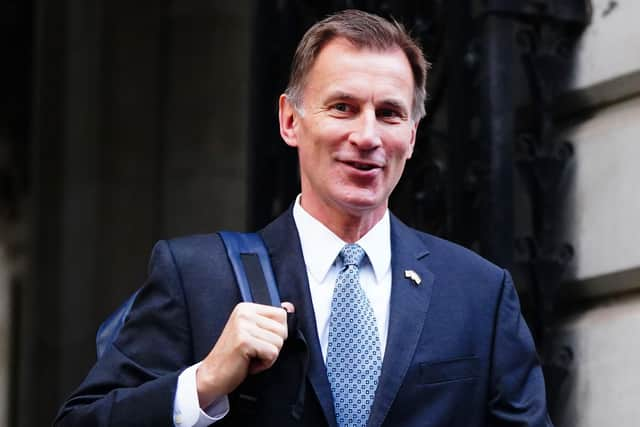RECAP: Jeremy Hunt increases the windfall tax on oil and gas giants | Triple lock pension and living wage update | Labour says UK economy put into “doom loop”
Mr Hunt has increased the windfall tax on oil and gas giants from 25% to 35% and imposed a 45% levy on electricity generators to raise an estimated £14 billion next year.
Households will face increased energy bills, high inflation and tax hikes as the country is hit by recession.
Advertisement
Hide AdAdvertisement
Hide AdChancellor Jeremy Hunt told MPs he was having to make difficult decisions to ensure a “shallower downturn”, but the economy was still expected to shrink 1.4% in 2023.


The Office for Budget Responsibility (OBR) forecast the UK’s inflation rate to be 9.1% this year and 7.4% next year, contributing to the squeeze on living standards.
The cap on average household energy bills will increase from £2,500 to £3,000 from April.
But Mr Hunt said “this still means an average of £500 support for every household”, while there would also be additional cost-of-living payments for people on means-tested benefits, pensioner households and those on disability benefit.
Mr Hunt was setting out a package of around £30 billion of spending cuts and £24 billion in tax rises over the next five years.
His package is in stark contrast to his predecessor Kwasi Kwarteng’s ill-fated plan for £45 billion of tax cuts, less than two months ago, which spooked the markets, pushed up the cost of borrowing and contributed to the downfall of Liz Truss’s short-lived administration.
Autumn Budget LIVE as chancellor to unveil spending cuts and tax rises
Ian Blackford, the SNP Westminster leader, said that “optimistic signs” on inflation from the Bank of England mean the Chancellor does not need to bring in the “austerity measures” expected in today’s autumn statement.
Mr Blackford told Sky News: “I think it really brings into question a lot of the austerity measures that we know that the Chancellor is going to bring in today.
“He doesn’t need to be doing this, it’s a political choice as much as anything else.”
The SNP MP called for windfall taxes on companies that “have benefited from high energy prices” and said a tax on share buybacks “would bring in £11 billion”.
He added that the economy was “smaller because of Brexit” and that “we should be honest about its impact”
Prime Minister Rishi Sunak said there was a “shared determination” among world leaders at the G20 summit to “restore stability, deliver long-term growth and drive a better future, one where no single country has the power to hold us back”.
Making a statement to the Commons on his visit to the G20 summit, Mr Sunak told the Commons: “In just a few moments the Chancellor will build on these international foundations when he sets out the autumn statement, putting our economy back on to a positive trajectory and restoring our fiscal sustainability.”
The Prime Minister has said the UK is “at its best” when it is an “active member” of the global community.
Rishi Sunak told the Commons: “My reflections on the summit, and indeed on attending Cop are that the United Kingdom is at its best when we are an engaged, an active member of the global community, where we are standing up for our values, where we are defending our interests, but also spreading prosperity and alleviating poverty and suffering.
“I’m pleased to have had conversations with so many leaders over the past couple of days, it confirms to me that they very much welcome that UK support in achieving all of those objectives and that’s what this Government will set about doing.”
Chancellor Jeremy Hunt is on his feet in the House of Commons, delivering his statement on the economy. You can follow live updates here.
Chancellor Jeremy Hunt told the Commons: “In the face of unprecedented global headwinds, families, pensioners, businesses, teachers, nurses and many others are worried about the future.
“So today we deliver a plan to tackle the cost-of-living crisis and rebuild our economy.
“Our priorities are stability, growth, and public services.
“We also protect the vulnerable because to be British is to be compassionate and this is a compassionate Conservative government.”
There are laughs around the Commons as Jeremy Hunt tells MPs "Credibility cannot be taken for granted"
High inflation is the “enemy of stability”, the Chancellor has said.
Jeremy Hunt told the Commons: “We are not alone facing these problems, but today our plan reflects British values as we respond to an international crisis.
“We are honest about the challenges and fair in our solutions. Yes, we take difficult decisions to tackle inflation and keep mortgage rises down but our plan also leads to a shallower downturn; lower energy bills; higher long-term growth; and a stronger NHS and education system.”
He added: “Three priorities then today: stability, growth and public services. I start with stability. High inflation is the enemy of stability. It means higher mortgage rates, more expensive food and fuel bills, businesses failing and unemployment rising. It erodes savings, causes industrial unrest, and cuts funding for public services. It hurts the poorest the most and eats away at the trust upon which a strong society is built.”
The Office for Budget Responsibility has confirmed “global factors are the primary cause of current inflation”, the Chancellor said as he began his autumn statement.
Jeremy Hunt told the Commons: “The Office for Budget Responsibility confirms global factors are the primary cause of current inflation. Most countries are still dealing with the fallout from a once-in-a-century pandemic.
“The furlough scheme, the vaccine rollout, and the response of the NHS did our country proud – but they all have to be paid for.
“The lasting impact on supply chains has made goods more expensive and fuelled inflation, this has been worsened by a Made in Russia energy crisis.”